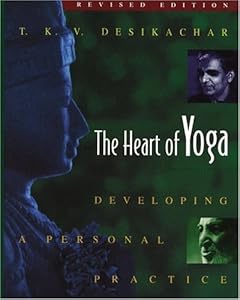 Cover via Amazon
Cover via Amazon
Thanks to the
Namaste Book Club, a new online group dedicated to the discussion of yoga-related books, I am reading
The Heart of Yoga by
T. K. V. Desikachar again. I've had the book so long I can't remember where I got it, or if I ever read the whole thing. The last time I pulled it off the book shelf was during yoga teacher training, when I needed some Sanskrit words for a presentation. This time I'm starting at the beginning and reading cover to cover. I've just finished the second chapter and I'm chewing on what I read.
Desikachar points out that
Patanjali's Yoga Sutras do not include a discussion about God. In the Sutras, yoga is defined as the settling of the mind into stillness. The practice of yoga makes us more present, more aware, able to think more clearly, and, as a result, we become who we are truly meant to be. By keeping God out of it, Patanjali kept yoga accessible to everyone, no matter what belief, or disbelief, he had. Considering how much strife has resulted from differing religious beliefs, I'd say that Patanjali had amazing foresight.
While yoga doesn't come with a god, God doesn't stay out of yoga, or at least He didn't for me. I was raised Methodist, but once I was out of my parents' house I started on a long, twisting path away from the church. Convinced that I couldn't be an empowered female in the patriarchal church, I wandered to goddess-based Wicca, explored some other earthy Pagan variants, tried Buddhism, then settled into the Unitarian Universalist church for awhile. I stayed far away from God the Father.
Then, during yoga teacher training, we read the
Bhagavad Gita and I discovered a male god who worked for me. Krishna, as described in the Gita, is powerful and demanding, yet wise and compassionate. As I read, my childhood religious education started to come back to me. Something about the story allowed me to reconcile all the concepts of divinity I'd come to know and integrate the Christian God into my own unique spirituality.
What I ended up with was a very personal relationship with God, one that is not dictated by church doctrine or another standardized belief system. I am again comfortable in a church service, free to enjoy the parts that resonate with me and reject those that don't. I can sing my heart out at kirtan, confident that my connection with the Divine is not compromised by the name I'm chanting. I can sit in meditation and hear God's messages to me, and when I teach yoga I trust that the Great Guru is speaking through me.
I guess that, in the stillness of my yoga practice, God settled into me.
Note: While I was busy fluttering from religion to religion, my little brother was at the seminary. He has a PhD in Theology and is a full-time Methodist minister. There have been some interesting discussions over family dinners, as I'm sure you can imagine. Despite my collection of pentagrams, our disagreement about the nature of God and the fact that I still mock him sometimes as only a big sister can, he loves me. It's nice to know that, if I'm wrong about all this, he'll be there to see me into Heaven.
 Image via Wikipedia
Image via Wikipedia
![Reblog this post [with Zemanta]](http://img.zemanta.com/reblog_c.png?x-id=7ed29465-688c-43a3-afc1-b128649d31a6)

![Reblog this post [with Zemanta]](http://img.zemanta.com/reblog_c.png?x-id=e3c2c511-829e-4542-baf1-6765ca5b54f4)

![Reblog this post [with Zemanta]](http://img.zemanta.com/reblog_c.png?x-id=fef80e99-02e8-4918-a565-0a32ab7dac4c)